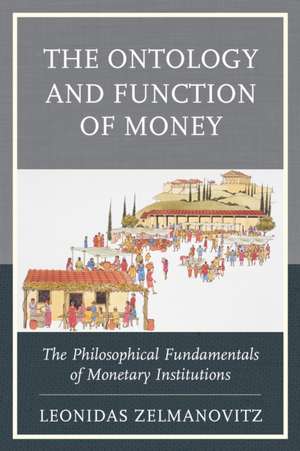ONTOLOGY AMP FUNCTION OF MONEY TPB: Capitalist Thought: Studies in Philosophy, Politics, and Economics
Autor Leonidas Zelmanovitzen Limba Engleză Paperback – 16 iul 2017
Din seria Capitalist Thought: Studies in Philosophy, Politics, and Economics
- 25%
 Preț: 559.94 lei
Preț: 559.94 lei - 23%
 Preț: 644.14 lei
Preț: 644.14 lei -
 Preț: 292.17 lei
Preț: 292.17 lei - 27%
 Preț: 951.16 lei
Preț: 951.16 lei - 23%
 Preț: 682.13 lei
Preț: 682.13 lei -
 Preț: 334.34 lei
Preț: 334.34 lei - 23%
 Preț: 693.23 lei
Preț: 693.23 lei -
 Preț: 415.56 lei
Preț: 415.56 lei - 23%
 Preț: 647.76 lei
Preț: 647.76 lei - 27%
 Preț: 819.81 lei
Preț: 819.81 lei - 23%
 Preț: 685.39 lei
Preț: 685.39 lei - 23%
 Preț: 685.85 lei
Preț: 685.85 lei -
 Preț: 412.18 lei
Preț: 412.18 lei -
 Preț: 412.94 lei
Preț: 412.94 lei - 27%
 Preț: 682.94 lei
Preț: 682.94 lei -
 Preț: 368.40 lei
Preț: 368.40 lei - 27%
 Preț: 681.83 lei
Preț: 681.83 lei -
 Preț: 331.21 lei
Preț: 331.21 lei - 27%
 Preț: 897.39 lei
Preț: 897.39 lei - 27%
 Preț: 905.53 lei
Preț: 905.53 lei -
 Preț: 415.56 lei
Preț: 415.56 lei -
 Preț: 374.00 lei
Preț: 374.00 lei - 27%
 Preț: 816.44 lei
Preț: 816.44 lei
Preț: 543.38 lei
Nou
Puncte Express: 815
Preț estimativ în valută:
103.98€ • 108.83$ • 86.54£
103.98€ • 108.83$ • 86.54£
Carte tipărită la comandă
Livrare economică 31 martie-14 aprilie
Preluare comenzi: 021 569.72.76
Specificații
ISBN-13: 9780739195130
ISBN-10: 0739195131
Pagini: 488
Dimensiuni: 152 x 229 x 35 mm
Greutate: 0.69 kg
Editura: Rowman & Littlefield
Seria Capitalist Thought: Studies in Philosophy, Politics, and Economics
ISBN-10: 0739195131
Pagini: 488
Dimensiuni: 152 x 229 x 35 mm
Greutate: 0.69 kg
Editura: Rowman & Littlefield
Seria Capitalist Thought: Studies in Philosophy, Politics, and Economics
Notă biografică
By Leonidas Zelmanovitz
Descriere
This book examines the characteristics of monetary institutions and the ways in which a clear understanding of money, and a sense of what we can know about money, can improve our comprehension on monetary policy. It establishes a link between abstract and theoretical aspects of monetary theory and the problems with money and banks we face today.
